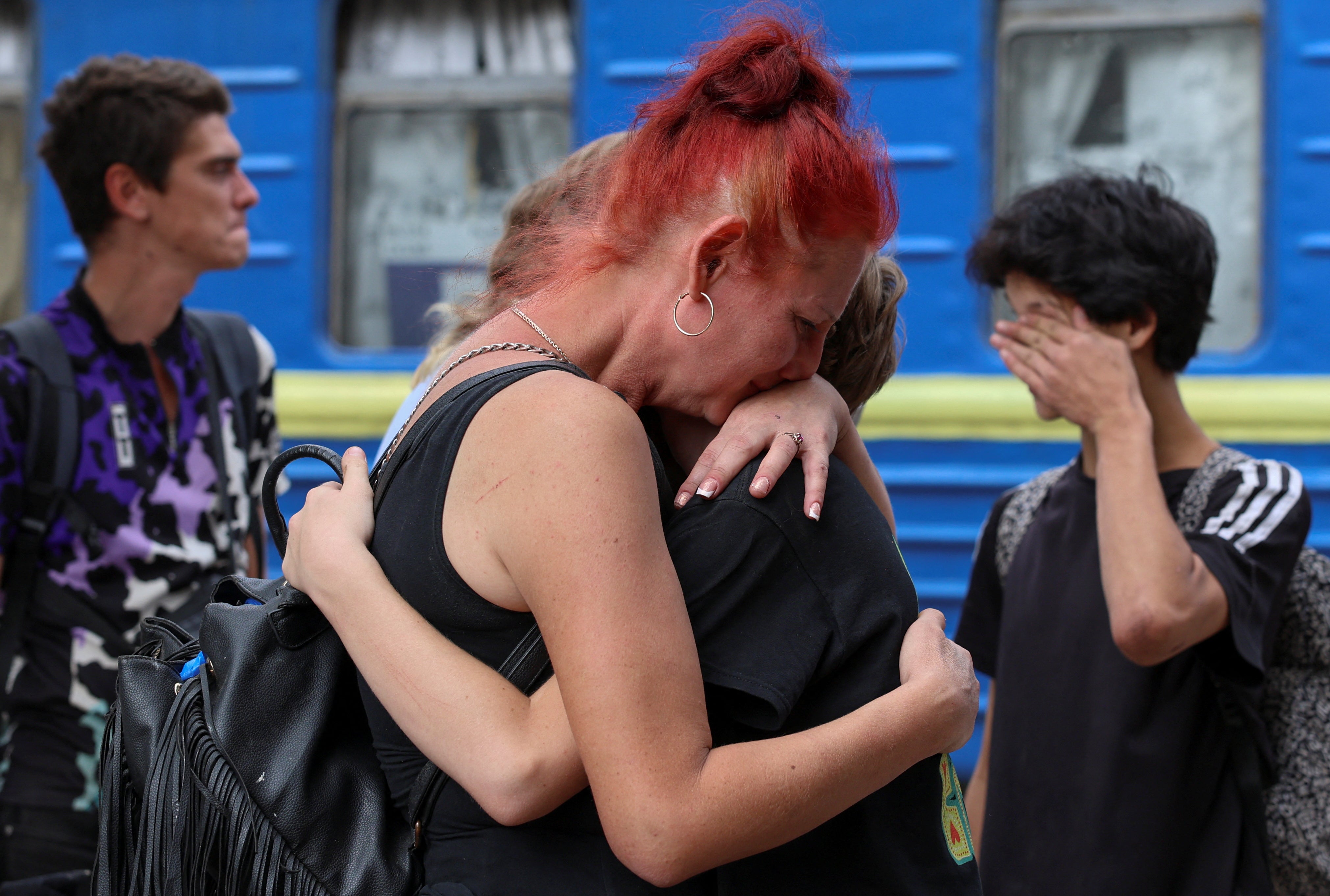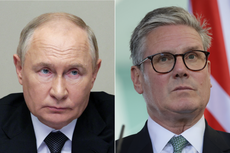Putin’s forces are desperate for a prize eastern city and Ukraine will fight street to street to keep them out
The Russians taking Pokrovsk would split Ukraine’s defensive line in the region and harm supplies in the eastern part of Donetsk. Now facing constant bombardment, soldiers and residents in Pokrovsk speak to Askold Krushelnycky about the drawn-out siege they are bracing themselves for


The city of Pokrovsk, regarded as the key to controlling Ukraine’s eastern Donetsk region, has been the prize Vladimir Putin’s troops have sought for months – one for which Moscow has already sacrificed thousands of its troops.
Since the 2022 invasion of Ukraine, seizing the entire Donetsk region, which has seen the most prolonged and bloodiest battles in Europe since the Second World War, has been the Kremlin’s oft-declared top priority.
Pokrovsk has stuck obstinately in Putin’s craw and in recent months, massive resources have been concentrated to try to break Ukrainian defences. Moscow’s forces have mounted often suicidal infantry assaults, without regard for casualties.
A senior military source of The Independent confirmed that elements of at least three experienced brigades, including the Azov and Kara-Dah brigades, had been deployed to stiffen the Ukrainian forces around Pokrovsk which, he said, are outnumbered 10 to one by their enemy in some places.
The source, a colonel connected to the Ukrainian general staff, said heavy battles are raging close to Pokrovsk along a line of small towns like Myrnohrad, Novohrodivka, Seldovo, Ukrainsk and Hirnyak to the southeast of Pokrovsk and Kurakhove and Vuhledar to the south.
Heavy equipment is being used to dig a crescent of defences – trenches and other fortifications – that will weave through or between those towns and villages. He said mines, some sown by drones, would disrupt Russia’s “human-wave” assaults.
The Ukrainian General Staff said on Monday that the fiercest battles are around the small town of Kurakhove, where Russian ground and air forces have launched scores of attacks each day for the past week, using their, now-routine, human wave tactics of sending men, sometimes backed by tanks and armoured personnel carriers. Most civilians have evacuated from the area but one person was killed in Kurakhove on Sunday by Russian artillery.

Ukraine is determined to hold onto the area for as long as possible and the fighting will likely turn into another prolonged siege involving grinding close-quarter battles, street by street and house by house, as was the case in Bakhmut, where the Russians eventually conquered a pile of rubble.
The commander in chief of Ukraine’s military, General Oleksandr Syrskyi, has said that defences around Pokrovsk have been reinforced with several reserve brigades and the Russian advance had been slowed.
“Ukrainian forces are preparing for street battles. The Russians are certainly not going to be able to get Pokrovsk imminently and we will be able to prevent them entering for weeks or months and hopefully until winter where they will not be able to advance further,” The Independent’s colonel source says.
The Russians taking Pokrovsk would split Ukraine’s defensive line in the region and vastly complicate supplying its forces in the eastern part of Donetsk. In turn, that would jeopardise Kyiv’s ability to cling onto its remaining strongholds there such as Slovyansk, Kramatorsk, Kostyantynivka, Chasiv Yar and Toretsk.

Losing Pokrovsk would also open up a path westwards to Ukraine’s Zaporizhzhia region for the Russians.
Even then, being in Pokrovsk does not mean the Russians will be able to use the road and rail routes passing through the town as they will be within reach of Ukrainian artillery. The most direct route from Ukrainian-controlled territory is already too dangerous for civilian vehicles as traffic is visible to Russian drones and within reach of its artillery and mortars. The roles would be reversed for Russian vehicles trying to reach a Pokrovsk in Moscow’s hands.
The Independent entered Pokrovsk from the north, via the town of Dobropillya. The effect of the intensified Russian encroachment was dramatic and obvious to see, not only in the streets with few pedestrians but in the closed supermarkets, stores, street markets, restaurants and cafes that had been busy when The Independent last visited Pokrovsk in the spring.
The sounds of explosions are constant, not just in the direction of the Ukrainian defensive lines but within the town itself where a huge number of residential and commercial buildings have been destroyed.
Billboards with the word “evacuation” in huge letters and a telephone number at once advise where to seek assistance and remind remaining residents that the government wants civilians to quit the city. Some 38,000 of Pokrovsk’s pre-war population of 60,000 remain, according to the city’s military administration.

Police cars cruise through the largely empty streets using loudhailers to urge remaining residents to leave and repeat that telephone number. The town still has electricity and gas but the tap water is too contaminated to drink.
Some people are determined to defy the seemingly inevitable by trying to maintain normal routines for as long as possible. A few small grocery shops are operating and at one, cafe soldiers sit at outside tables sipping coffee as explosions boom out.
Irena Paulina, 66, says she is not going to leave Pokrovsk for now as she has to care for her 83-year-old mother who is too frail to travel. She is pushing a bicycle with supplies including apples and bread along her road past houses that were recently destroyed by Russian bombs.
“I’m afraid but I can’t leave my mother. Many of my neighbours have left but others are still here,” she says. “We are waiting to see what happens. If the situation gets worse, I suppose we’ll have to leave. We know what the Russians have done in places they have occupied and we are not going to wait for them to come here. But we still hope that the Ukrainian army will be able to prevent them coming in.”

Another woman, who gives her name as Yelena and says she gets her news from Russian TV and internet media, says she might even stay if the Russians looked like capturing the town.
“Many of us have become so tired of the situation, this war and the destruction, that we don’t care who is in charge here,” she says.
Ukrainian authorities know that some of those insisting on remaining in Pokrovsk and the surrounding towns want to see the Russians in control. They are contemptuously called “zhdany” – the ones who wait.
Around 200 people were waiting at Pokrovsk’s open-air railway station for the free seating on a daily evacuation train heading westwards to the city of Dnipro and then to Lviv.
Oleksandr, 63, was an engineer in the town’s water heating facility for the Soviet-style central heating for offices and residential buildings. He says: “The Russians are shooting at us all the time. Two days ago, shells landed close to our home and then near a market we were going to.”
He adds his wife Valentyna, 65, had already left to stay with relatives in western Ukraine’s Khmelnitskyi region but his son, Denis, 35, was staying on to fight in the Ukrainian army. “We don’t want to leave and of course, we’ll come back if we can. I don’t think the Russians will stay here forever and things will become better.”

Ira Antonenko, 33, a PE and history teacher, and her daughter Tania, 15, are sitting on the platform while waiting for the train in baking heat. Ira says she had resisted for weeks leaving the town, even as the tempo of shelling increased.
“I am divorced and we live alone. I have put everything I’ve ever earned from my job into our own house and making it into a nice place, which I hoped I’d be able to pass on to my daughter eventually,” she says.
“But there were so many explosions close to our house and some of my friends and neighbours have been injured. It was as if God was telling us to leave. I became worried for the life of my daughter and I also want to carry on living. So I decided a couple of days ago on the spur of the moment to leave. We’ve packed and got ready in one day.”
With just a few bits of luggage and their dog, Sonia, they were heading to the Kirovohrad region, about five hours west.
“It’s all so strange,” Ira says. “I’m a history teacher and now we’re living through terrible events that will become part of our country’s history. I hope there will be a happy conclusion but, right now, I don’t know what the future holds.
“I feel anxious because I don’t know what work I’ll get and where we will live,” she adds. “I feel like everything I worked for has gone and I will have to start all over again. But I think we’ll be OK.”

Yevhen Lebedenets, 24, had been a professional soldier before the Russian invasion. He was caught in a blast from a glide bomb in Kryvi Rih, about four hours west by road, on 2 May this year and lost his left arm.
Yevhen has a prosthetic limb and is waiting for a more sophisticated one later this year. “Just because someone has lost an arm or a leg or more than one limb, doesn’t make them useless. I want my life to be as ‘normal’ as possible. For instance, I want to be a driver again and I can easily drive a vehicle if it has automatic gear change. I just need to adapt and people need to adapt to us.”
Yevhen, who intends to join his parents already living in Kyiv, says: “I spent the last few days packing some things I could send to my parents and giving away large things like the fridge and television sets. Then, a few hours ago, I locked the house and I don’t know if I’ve left it for the last time.”
Yevhen says he spoke to Ukrainian soldiers – and that they were tired but determined to fight on. “I think Pokrovsk can hold out for at least another six weeks.”
“If the Russians eventually enter Pokrovsk, it will be after the town is reduced to piles of rubble as in other Russian ‘victories’ such as Bakhmut, Mariupol and Avdiivka,” he adds. “And even then, we will return and they will be kicked out.”
Join our commenting forum
Join thought-provoking conversations, follow other Independent readers and see their replies
Comments


Bookmark popover
Removed from bookmarks